If the medium is indeed the message then it seems like the crossover of a prose writer into the world of screenwriting would be as extreme as a unicorn turning into a panda. And though we can conceive of all sorts of shape shifting in the realms of science fiction, when you stop to think about it, writers switching from the medium of the page to the medium of the screen is actually a little bizarre. With science fiction and fantasy writers it happens quite a bit, but sometimes mainstream literary writers take on SFF screenplays for greater fame and glory. Or maybe money.
In any case, the results are often interesting, if oft-mentioned. Here are four literary writers who took on screenplays for genre films and one science fiction writer who took on a literary film. And because Genre in the Mainstream is all about books, all of the films are adaptations.
Roald Dahl adapted You Only Live Twice
A friend of the late Ian Fleming, famed children’s author Roald Dahl was the second choice to pen the screenplay for the James Bond film You Only Live Twice after Harold Jack Bloom’s script didn’t work out. Both spy and children’s lit connections seem to fuel this interesting choice of a Bond-screenwriter. In what is one of the most bizarre pieces of trivia ever, Ian Fleming’s contribution to the letters of humanity includes the canon of 007 AND the children’s story Chitty Chitty Bang Bang. Dahl also wrote the screenplay version of this one, but things get a little creepy when you consider James Bond was sometimes referred to as “Mr. Kiss Kiss Bang Bang.”
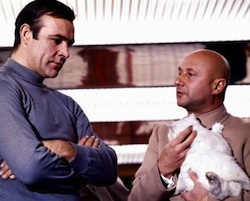 For anyone who knows more than a little bit about Roald Dahl, his forays into non-children’s literature are significant and memorable. (Read the short story “Royal Jelly” now!) But with You Only Live Twice, Dahl offers a Connery-era Bond film that is essentially by the numbers. However, some of the dialogue isn’t as riddled with groan-inducing puns as other Bond outings. When Blofeld’s main goon falls into a vat of piranhas Bond simply says “bon appetit” like he’s just phoning in a diss. Oddly, some of this makes You Only Live Twice play out like a Bond parody. Is this Dahl’s fault and intention? Or did his particular brand of irony accidentally turn You Only Live Twice into some kind of Bond ouroboros? Whether it was intentional or not, the self-awareness seems to be there. One thing is for certain, of all of Roald Dahl’s plots, this one makes the least sense.
For anyone who knows more than a little bit about Roald Dahl, his forays into non-children’s literature are significant and memorable. (Read the short story “Royal Jelly” now!) But with You Only Live Twice, Dahl offers a Connery-era Bond film that is essentially by the numbers. However, some of the dialogue isn’t as riddled with groan-inducing puns as other Bond outings. When Blofeld’s main goon falls into a vat of piranhas Bond simply says “bon appetit” like he’s just phoning in a diss. Oddly, some of this makes You Only Live Twice play out like a Bond parody. Is this Dahl’s fault and intention? Or did his particular brand of irony accidentally turn You Only Live Twice into some kind of Bond ouroboros? Whether it was intentional or not, the self-awareness seems to be there. One thing is for certain, of all of Roald Dahl’s plots, this one makes the least sense.
Michael Chabon co-wrote both John Carter and Spider-Man 2
Why did Pulitzer Prize and Hugo Award winner Michael Chabon participate in the writing of such huge Hollywood projects like John Carter and Spider-Man 2? Was he just sick of being broke? Even if Chabon was in it for the money, his love of pulp fiction is obviously boundless. Starting with his more recent big screen foray; part of the reason John Carter isn’t a crappy film is because it has a little bit of heart, which might be due to Chabon’s influence. Like his literary buddy Jonathan Lethem, Michael Chabon best novels (I prefer Mysteries of Pittsburg to Kavalier and Clay, but whatever) tend to feature uncomplicated characters who are put in complicated situations. In serious literature, this is one of the things Chabon really has going for him, and it translates well in John Carter. A lot of people have called the movie a “throwback” which is something Chabon does well with characters; he makes throwbacks seem like a new idea.
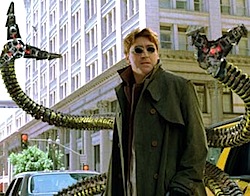 On his contributions to Spider-Man 2, many of the differences between his script and the final version came to light last year when McSweeney’s posted a PDF of his original script. A bunch of stuff was changed from Chabon’s ideas, most notably a different kind of Doc Ock, including the villain hitting on Mary Jane, instead of being married. (Briefly, anyway.) Here, Chabon created a more direct and personal reason for Peter to have rivalry with Doc Ock other than the obvious “don’t blow up the city” stuff. However, even with much of the screenplay changed, you can sense from the first scene of Spider-Man 2 that someone else is behind the dialogue. This isn’t to say the first Spider-Man movie is bad, simply that Chabon’s Peter Parker feels a little more well-rounded. Again, Peter Parker isn’t a terribly complex character, and Chabon knows that. He’s written well in this movie, with Pulitzer Prize-winning nuance and love.
On his contributions to Spider-Man 2, many of the differences between his script and the final version came to light last year when McSweeney’s posted a PDF of his original script. A bunch of stuff was changed from Chabon’s ideas, most notably a different kind of Doc Ock, including the villain hitting on Mary Jane, instead of being married. (Briefly, anyway.) Here, Chabon created a more direct and personal reason for Peter to have rivalry with Doc Ock other than the obvious “don’t blow up the city” stuff. However, even with much of the screenplay changed, you can sense from the first scene of Spider-Man 2 that someone else is behind the dialogue. This isn’t to say the first Spider-Man movie is bad, simply that Chabon’s Peter Parker feels a little more well-rounded. Again, Peter Parker isn’t a terribly complex character, and Chabon knows that. He’s written well in this movie, with Pulitzer Prize-winning nuance and love.
Mario Puzo wrote Superman: The Movie
Naturally there’s a lot of controversy around this one, and though Mario Puzo wrote the initial screenplay, a lot ended up being altered not only in this installment, but also in Superman II. Briefly, the plots of Superman and Superman II were essentially conceived as one story. But because of various studio meddling and the firing of the original director, certain elements were changed. Does this have anything do with appreciating the genius of Godfather novelist Puzo’s impact on the Superman mythos forever? Not really. Though the restored Richard Donner cut of Superman II is certainly a grittier, better film than the original version, I’d go out on a limb and say most of Puzo’s good ideas for Superman survived the various negative machinations and dust-ups. The most obvious Puzo-touch in the original Superman (and echoed in Superman II) is the notion of familiar influences. Superman is not a member of any one particular family mob, but instead an orphan caught in-between a variety of families. Is he a Kent? Or is he a Kryptonian? The fact that he can’t ever truly shake his awesome and dangerous heritage is explored with just enough trepidation to make the most famous version of Superman also the most vulnerable.
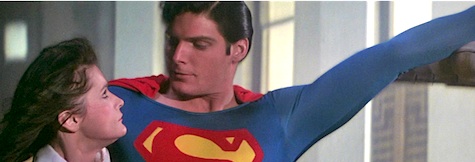
But it’s with Lois Lane where I truly love the Mario Puzo screenplay for Superman. When Supe first rescues Lois in the famous helicopter-crashing scene he says, “I’ve got you!” to which Lois replies, “You’ve got me? Who’s got you?” Perfect. I also love the fact Lois is a bad speller, smokes cigarettes, and eats cheeseburgers. There’s always a bunch of concern as to how to make Superman relevant or exciting, or not too much of a cookie-cutter character. These movies may have gotten lucky with casting, but there’s no way an accomplished writer like Mario Puzo didn’t have something to do with the fact that the first two films have what all Superman films have since lacked- substance.
Dave Eggers adapted Where the Wild Things Are
Here’s an instance in which I don’t think the choice for such an accomplished novelist to adapt a famous story really worked. Beyond the fact that most of The Wild Things are deeply depressed creatures in the film as opposed to their more jovial counterparts in the book; the biggest in-universe change from the source material occurs in the way in which Max is transported to the world of The Wild Things. In the storybook, the forest simply grows inside of Max’s room, but in the film, he runs away and finds the boat literally waiting for him at a dock. This change made no sense to me when I first saw the film, but now it seems like it’s an issue of story ownership.
It feels like the moment when Dave Eggers wanted to let the audience know this was a different story. He even published a tie-in novel called The Wild Things around the release of the film. Despite many people being constantly annoyed with Eggers, he is a fine writer, though certainly not to everyone’s taste.
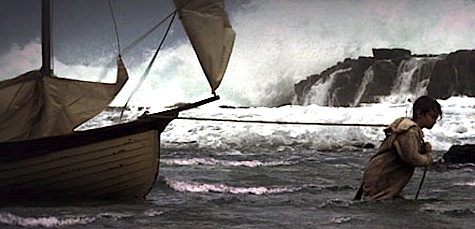
In contrast with Chabon, Eggers likes complicated and contradictory characters, which is what he grafts onto Max and the Wild Things. Some of it works, but mostly it feels like it might be better on the page than in the film. Indeed, his novel The Wild Things is actually not terrible and may have been a more fitting companion to the classic children’s story than the film upon which it was based. The problem with Eggers doing Where the Wild Things Are is that he’s too earnest for the material. This would be like if Jonathan Franzen or Joyce Carol Oates had written the latest Muppets movie. Interesting, but not something you’d really want to see.
Ray Bradbury adapted Moby Dick
The best screen version of Moby Dick (other than Star Trek: First Contact, duh) is easily the John Huston directed film written by science fiction badass Ray Bradbury. But just like there was tension between Ahab and the crew of the Pequod, Bradbury and Huston didn’t see eye to on a lot of the process. Bradbury fictionalized this experience numerous times, including in the novel Green Shadows, White Whale. But like all the behind-the-scenes drama on Superman, does the famous Gregory Peck Ahab truly suffer? Not really.
Moby Dick is such a science fiction concept to begin with, that it makes sense for Bradbury to be at the helm in adapting it for the screen. It’s a novel about a lot of things, but it’s also a story about a giant monster, which Bradbury can handle. My favorite myth about Bradbury writing the screenplay is his claim that he’d never actually read the book prior to embarking on the project. The lean and mean qualities of Bradbury’s prose against Melville’s is a serious juxtaposition, and yet the poetry of the novel is retained in the film.
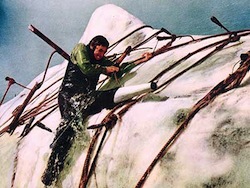 And even though he was a writer primarily for the page, Bradbury did make a few changes to Moby Dick which are—dare I say it—are better than the novel. Instead of the character Fedallah being lashed to the back of the beast, Ahab is upon its back in Bradbury’s version. And while it’s not crazy to say Bradbury is the more cinematic writer compared to Melville, it is interesting that a science fiction writer could conceive of a more powerful image than the original novelist himself.
And even though he was a writer primarily for the page, Bradbury did make a few changes to Moby Dick which are—dare I say it—are better than the novel. Instead of the character Fedallah being lashed to the back of the beast, Ahab is upon its back in Bradbury’s version. And while it’s not crazy to say Bradbury is the more cinematic writer compared to Melville, it is interesting that a science fiction writer could conceive of a more powerful image than the original novelist himself.
Are there even more examples of literary writers taking on genre films? Examples which are NOT book adaptions? What about the reverse? Science Fiction authors writing scripts which are kitchen-sink dramas? Let me know in the comments below.
Ryan Britt is the staff writer for Tor.com.










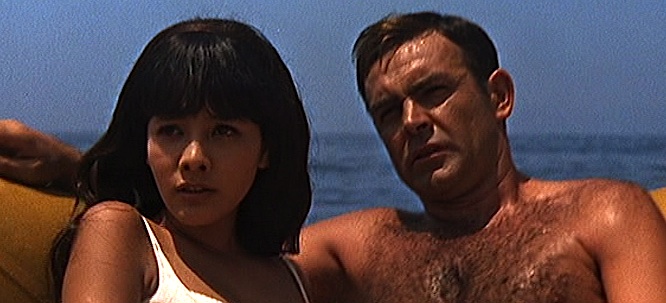
Well, William Faulkner wrote the screenplay for the gangster melodrama “To Have and Have Not” (and he did touch-up work on a bunch of things for no credit, such as “Mildred Pierce” and “Gunga Din”). I guess it depends on what counts as “genre.” Faulkner was clearly the model for the character of Mayhew (John Mahoney) in “Barton Fink.”
Also, Clifford Odets wrote the Elvis movie “Wild in the Country”
First thing that came to my mind was The Shawshank Redemption. Frank Darabont wrote the screenplay…based on a short story by Stephen King.
Martin Amis wrote Saturn 3!
http://en.wikipedia.org/wiki/Saturn_3
Star Trek: First Contact? You mean Wrath of Khan, right?
William Faulkner and Leigh Brackett on The Big Sleep.
Martin Amis wrote Saturn 3? Now I have to watch it…. if I can track that beast down.
DarrenJL
Take it from me, you don’t really want to unless you’re into riffing ala MST3K.
A truly horrible movie even with Farrah Fawcett on board as the obligatory eye candy.
@@.-@ In First Contact Zefran Cochrane’s assistant makes the statement that the Borg are Picard’s Moby Dick and he quotes some out of the book.
Khan also quotes some from Moby Dick I think but back then they would just drop a quote and let it go at that. Now adays they drop the quote turn to the camera and say AND THAT WAS FROM MOBY DICK!
George MacDonald Fraser wrote the screenplay for “Octopussy”, one of the more forgettable Bonds, but notable for a) breaking the fourth wall by having someone whistle the Bond theme tune as a secret recognition signal and b) starting the inevitable car chase with “We’ve got company!” “No problem! This is a company car!”
If we can broaden the list to include screenplays that never made it to production, then I submit the oddest entry for your consideration: Aldous Huxley, author of Brave New World, wrote a screenplay for a feature length Mr. Magoo cartoon…. and it was based on Don Quixote. Apparently the studio couldn’t use the script because no-one had the heart to tell the nearly blind Huxley that Mr Magoo is short-sighted.
@graftonio: While I think it’s true that moviemakers today generally assume that audience members are illiterate lunkheads, in fairness Khan’s original appearence on Star Trek takes pains to make sure we don’t miss the reference to Paradise Lost.
George MacDonald Fraser also wrote the script for Red Sonja and Simon Raven was involved in the scripting of the Bond film On Her Majesty’s Secret Service.
It’s hard to make the arguement that Eggars was the wrong choice to write ‘Where the Wild THings Are’ when the end result was one of the ten best films of 2009. That film was amazing, and a huge critical success.
It sounds like they picked exactly the right guy!
Actually Leigh Brackett is also credited with screnplays for: The Vampire’s Ghost(1945), Crime Doctor’s Man Hunt (1946), Rio Bravo (1959), Gold of the Seven Saints (1961), Hatari (1962), El Dorado (1966), Rio Lobo (1970), The Long Goodbye (1973) and some TV.
And also a movie that used to be called, simply The Empire Strikes Back
This thing about Leigh Brackett co-writing The Big Sleep is blowing my mind. Thanks to Bill and Sam! The behind-the-scenes stuff from that movie is all totally fasincating.
Instead of just scripts written by novelists, how about novels written by screenwriters, like The Princess Bride by William Goldman? At the time, he was most famous for his script of Butch Cassidy and the Sundance Kid. But then The Princess Bride was made into a movie itself, and the circle was complete…
As someone who lives alternating between each writing medium, I was a bit put out by the references to novelists only writing screenplays for the money. Why can’t they just like movies? Certainly Michael Chabon came to John Carter as a fan.
That being said, I found the article inspiring; that this sort of crossover is well-rooted and still growing.